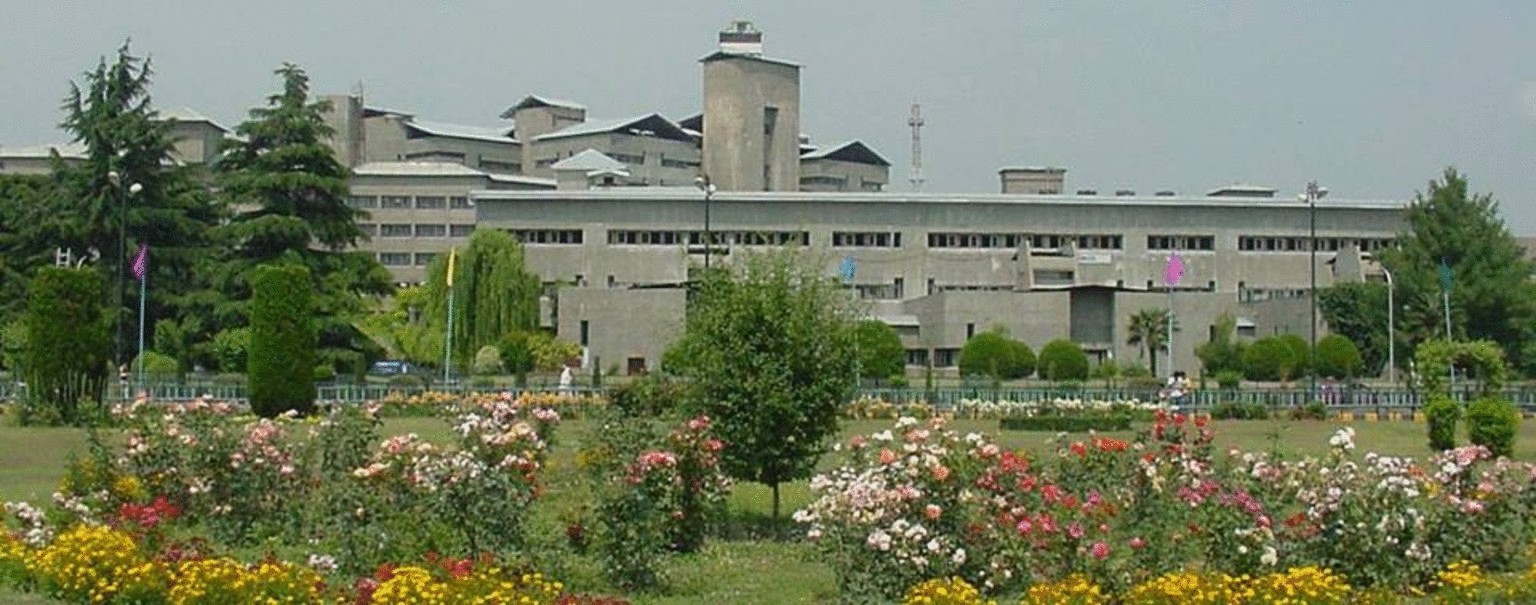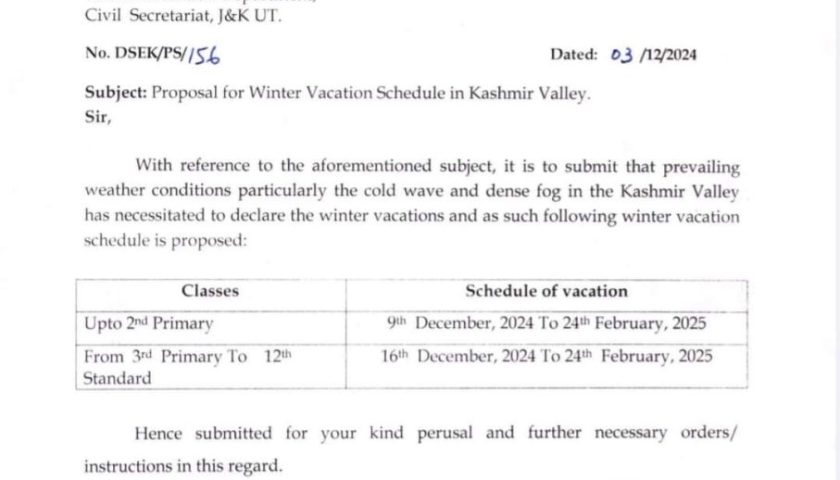Red tape, bureaucracy threaten a legacy of excellence in patient care, academics, research
Srinagar, Nov 10: The Sher-e-Kashmir Institute of Medical Sciences (SKIMS) in Soura, Srinagar, once a prestigious centre of medical excellence and the lifeline for the entire J&K populace, now faces unprecedented setbacks following the revocation of its pattern of governance. The recent policy shift, placing it under layers of bureaucracy, has left patients waiting longer for critical treatments, hindered recruitment of key staff, delayed vital research projects, and hampered academic advancements, the stakeholders opine.
For decades, SKIMS has been the last hope for people suffering from chronic and life-threatening ailments, the beacon of light for the severely injured. It has passed the test of time with its robust cancer treatment, state-of-art infectious diseases treatment protocols, and guidebook for other ailments. However, a senior administrator at the institute said, patients now have to wait even for basic medicines as the supplies have become erratic at the institute. The cancer drug shortage and the shortage of other essential drugs needed in a tertiary care hospital like SKIMS is not uncommon. “Earlier, we would plan and procure on our own. Now everything needs approval from the civil secretariat,” the administrator said. This “haphazard and laggard system”, he said, was also delaying procedures and even surgeries at the Institute.
Caught in Red Tape
The revocation of SKIMS’ autonomy has significantly impacted its operations. Previously, the Director of SKIMS held dual roles as both director and Ex-officio Secretary to the Government, as established by a 1980 cabinet decision (Cabinet Decision 267, dated June 9, 1980). This allowed the Director to route files directly to the Chairman of the Governing Body (the Chief Minister or Governor) through the Chief Secretary. Additionally, decisions made by the Governing Body did not require cabinet ratification (Govt order 173 of GAD, dated February 10, 2004). This structure provided SKIMS with an efficient administrative process, according to former Director Prof Parvaiz A Koul, who retired in March.
In February 2023, an order required SKIMS to route files through the H&ME Department, contrary to previous protocols. This move, seen as legally problematic by stakeholders, added bureaucracy and delays. SKIMS administration requested a review, and the order was revoked in October 2023, establishing a dedicated cell in the Chief Secretary’s office to manage SKIMS files. However, after Prof Koul retired in March 2024, it was ordered that files be routed through the H&ME Department again, causing significant delays and impacting patient care.
Recruitment and Procurement: Loss of Expertise and Quality
One of SKIMS’ two primary functions – recruitment – has also been severely impacted. Under the previous structure, the institute managed faculty-level recruitment through its Apical Selection Committee on the lines of AIIMS and PGIMER, which comprised 20 expert members and the only non-technical person is the Chairman, the Chief Secretary. This, in sync with most high-ranking healthcare institutes in the country and abroad, ensured that only the most qualified professionals were selected. Now, by dint of another recent order, the recruitment responsibilities have been assigned to the Jammu and Kashmir Public Service Commission (JKPSC), which typically involves only two technical experts on the panel.Jammu and Kashmir tourism
“The parity of the two is hugely divergent and does not align with the specialized needs of a medical institute of SKIMS’ stature. Further direct recruitment of a professor is at a level much higher than the chair of the PSC, insinuating an as yet untangled administrative knot,” Prof Koul said.
Procurement, another crucial function, has also been transferred to the Jammu and Kashmir Medical Supplies Corporation Limited (JKMSCL), which is responsible for supplying all medical facilities across the region. As a result, SKIMS faces frequent supply delays due to JKMSCL’s heavy workload. In the past, the institute’s procurement committee efficiently sourced necessary supplies on time. The delays created by JKMSCL have impeded routine operations and even critical services, directly affecting patient care. SKIMS has a full-fledged purchase and import cell that has stood the test of time for the past four decades. “JKMSCL is just not geared for it and the recent inability of approved purchases not getting realised is only a case in point,” a senior faculty member at SKIMS administration said.
Shortage of Staff, No Respite
It was revealed by a professor at the institute that a senior selection committee led by former director Prof A G Ahangar three years ago, and later followed by Prof Koul, is still awaiting approval, despite all queries having been addressed. This has resulted in stagnation fuelling loss of motivation and loss of talent. Only the JSC (Junior Selection Committee) decisions that the director is empowered to implement were ordered by Prof Koul. Even contractual appointments, cleared for advertisement by the authorities, have not been cleared for recruitment because for any person beyond Class IV, the Chairman Governing Body is the employer and as such approval for filling the positions is required. This delay in approvals extends to hiring junior and contractual staff. For instance, the recruitment of contractual nursing staff, intended to address nursing shortages, has not moved forward due to a lack of financial concurrence from the government. As a result, the institute is unable to address the increasing workload, putting immense strain on its existing personnel and directly impacting patient care.
Budgets Released for the Staff in Position
A senior faculty member at SKIMS expressed concern over the fact that the budget is released for positions in place rather than those that are approved. “This decision fails to take cognizance of the fact that SKIMS is a university conducting different courses and if we cannot recruit a professor in a particular department because of non-availability, the post cannot be annulled as practised in other departments,” he said.
He said that it was an important difference between SKIMS and other departments and has been overlooked. “It is lethal for SKIMS. Government cannot withdraw a post if not filled for two years,” he said.
Shrinking Budgets and Financial Constraints
SKIMS struggles to maintain its standards and is forced to limit the scope of its activities, compromising the quality of healthcare and research. Putting a strain on the institute’s resources, over the past few years, the budget has been curtailed a great deal, according to insiders. The administrative approvals for purchases beyond the director’s competence are often delayed or restricted, hindering the institute’s ability to spend on crucial procurement on time.
“I pursued a 128 CT scanner from the Directorate of Health Services which was approved by the then Health Secretary, Bhupinder Kumar under the advice of the then CS, Dr Arun Kumar Mehta. Eventually, it was installed after I left the office. We had kept funds for 256 CT and linear accelerator but no approvals were forthcoming, despite completion of all formalities,” Prof Koul said.
He said that the much-needed robotic system that costs over Rs 34 crores, if procured like this would ‘nearly guzzle the whole budget of the machinery and equipment’. “I approached Power Grid Corporation to help us out for this procurement under their CSR program and they agreed. I hope it is followed up to fruition,” said Prof Koul.
The robotic system has been a long pending demand of the surgical departments of the Institute, an asset that they have said would help a great deal in the advancement of patient services and academics.
Founding Director’s Remarks
Many prominent voices have spoken out about the importance of restoring autonomy to SKIMS, stressing that autonomy is not a way to bypass regulations but rather a method of bypassing unnecessary bureaucratic delays. Dr Ajit Nagpal, the founding director of SKIMS, has been vocal about the benefits of autonomy, emphasizing its importance in keeping the institute competitive with other leading medical institutions in India. In an interview in the recent past, Dr Nagpal said, “Autonomy facilitates quicker decision-making, particularly for recruitment and procurement, while maintaining all necessary regulations.”
He said that the unique status of SKIMS as a high-calibre technical institution requires autonomy to allow experts in the field to make timely decisions. According to Dr Nagpal, “Autonomy is fundamental for the success of an institution of this nature.”
Political Support for the Return of Autonomy
Adding momentum to this call for change, National Conference President, Farooq Abdullah, whose party swept the recent polls and assumed government in J&K, assured that the autonomy of SKIMS would be restored. “Write it in bold. We will restore the autonomy of SKIMS,” he said.
Last year, he led a delegation to LG Manoj Sinha seeking revocation of orders that took from the decision-making power of SKIMS Soura. His party’s support for restoring autonomy has rekindled hope among staff, patients, and the general public who are invested in the institute’s mission and future.
Save SKIMS, Save J&K
Prof Koul, who has been very vocal about the impact of the ‘downgrade’ of SKIMS said: “It was the vision of Sheikh Muhammad Abdullah and we can never develop the likes of it today. It enjoys an apical place in the healthcare and research arena of not only the country but even the world. SKIMS passouts are everywhere from peripheries in Kashmir to Harvard, Stanford and Mayo’s. The present government would do well to restore its functioning. It is important for everyone including those in power. In my opinion, statehood can wait, SKIMS cannot. It directly deals with the health of the residents of J&K and when it comes to importance, healthcare is supreme. It would also be in sync with their promised manifesto. Source






